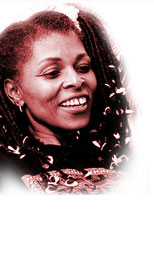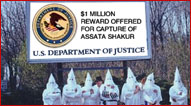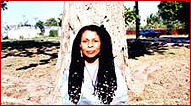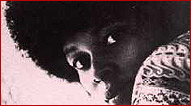


Search Site |
|

Assata Shakur talks to Pastors for Peace
"In 1979 I was liberated by some comrades and friends, and in 1984 I came to Cuba, where I was united with my daughter and was able to bond with her for the first time. And to begin healing the wounds. Here, I worked, studied, mothered and continued to be an activist. I found that Cuba was much different from the US; its government was genuinely trying to erase racism. But racism had grown out of slavery and exploitation and was very hard to eradicate quickly and completely. Cuba has been undergoing a process to eliminate racism.. ...Cuba like every other place has got to struggle against the whole racist ideology that it inherited, the culture, the eurocentric way of viewing the world where Europe is this big (shows with her hands) and Africa and Asia and Latin America are these little microscopic dots on the map. That's a process that has to be helped and contributed to by everybody, because the whole way the world is viewed now, the way that science, literature and history are used, is totally distorted and eurocentric. In order for the world to be free of racism that is a struggle that has to be waged on all fronts by all people. I think that more than anything, the whole cultural imperialism that is going on today where people, whether they're in Senegal, South Africa, Indonesia, are looking at this USA vision of the world that is totally distorted, totally unreal, that really diminishes and minimalizes the cultural values and wisdom of people all over the world, and sells this kind of McDonald-ized vision of the world that everybody is supposed to aspire to. Cuba is very important in that struggle, because Cuba is not only talking about racism in abstract terms, but connecting it with imperialism, which is the underlying motor of racism today. The underlying reason that racism keeps on being promoted in all of its various forms today. I think anybody who is honestly struggling against racism must struggle against imperialism and vice versa. Question: You could have gone to many countries for asylum. Why did you choose Cuba? Assata: I decided to come to Cuba for a variety of reasons. One, because it was close to the United States, and I considered it to be a very principled country. It has a long history of supporting victims of political repression, not only of people in the United States, like Huey Newton, Robert Williams, Eldridge Cleaver (a long list of people), but also people who were victims of political repression in other places, like Chile, the apartheid government of South Africa, Namibia, etc. I felt this was a place that held the principle of internationalism very close to heart, so I felt comfortable coming here. It was geographically close, so I wouldn't be separated from my family and friends. And I really wanted to see for myself what happens in a place that is trying to build socialism, that's trying to construct some form of social justice. That's trying to feed people, to make health care and education a right. When I came I had some very silly ideas, to be honest. My fantasy of Cuba was that everybody was going to be going around looking like Fidel, with green uniforms -- it was very different from my vision of how Cuba really was. People in Cuba are really very varied and everybody has his or her own personal style. I also found that people had all kinds of levels of consciousness, all kinds of levels of education, but that Cubans in general were very educated politically. I could go sit on a bus and get into a conversation with someone and find that person had a wealth of knowledge. And energy! What most impressed me about Cuba was the optimism. There are 11 million people on this island who have an incredibly optimistic vision of the world. My mother put it into words most clearly when she said: "If these people had not won, had not taken power, everybody would think they were insane!" (Laughs). People would think the whole revolutionary process was totally insane. How DARE these 11 million people on this little island think they can change the way that this planet is going? How dare they think they can stand up against the United States? That they can have their own system. But that is the kind of magic of Cuba - that people have this optimism, this pride, this belief- not only in themselves but in other people. That to me has been one of the psychic vitamins that has fed me since I've been here and that has taught me the power of people. I was a member of the Black Panther Party, and we used to say "Power to the People", but here in Cuba is where I've seen that put into practice, where I've seen that internalized by people in such a way that people feel empowered to build this planet and to change it. And to contribute and feel privileged to do that. Feel that when they go to sleep at night that all is not in vain. There is some sense in living on this planet. That there is some beauty in constructing something better and giving to other people. And work is a source of pride, not "Oh, I've gotta go to work in the morning". It's another way of looking at the world and another way of living on this planet. Question: Describe experience of being in Cuba, being exiled here. To what extent have you been able to continue being the political person you were in the United States? Assata: Well, exile is difficult. Anyone who says it's nothing, that it's easy, is simplifying things. Exile for me was hard. When I came here I spoke very little Spanish. Like two words! I couldn't communicate, and people would talk to me like I was a blooming idiot. Like, how did they know? The only conversation they could have with me were simple things like - "Hello, how are you?" There was no way I could express my personality in Spanish, tell jokes, be specific, describe anything...It was a hard adaptation process. But I went through it and in some ways I guess I continue to go through it. For me personally Cuba has been a healing place. When I first got here I had no sense that I had to heal or anything. When you're struggling for your life and you're in the midst of things, you don't feel all the blows. But after awhile I began to see that oppressed people, just by being oppressed-suffer serious wounds. You might go into a store, and somebody might follow you around the store, and you would have a choice of how to react: you could confront them and say "Why are you following me around the store?" or you could say to yourself: "Well, I came here to buy some socks, so let me just concentrate on buying the socks." But you still feel the pain. The obvious racism before had affected me, and in addition to that - prison, torture...my whole life had created wounds, scars in me that in Cuba I was able to find a space to begin to heal. To begin to think, "Yeah, this happened, and I can look at it and see it for what it was but not be there, not be destroyed by it, not be turned into something bitter and evil by it. And not be like my enemies. Because I think that the greatest betrayal that a revolutionary can participate in is to become like the people you are struggling against. To become like your persecutors, your oppressors. I think that is a betrayal and a sin. I think that people who want to change this planet have to seriously understand that as human beings we have to work to be good. I'm saying that in many ways: good at what we do, better people, better in the way we related to people, that we treat other people. Better in our ability to outreach to people. Better in so many ways. And the wounds that are inflicted on our families, on ourselves, we have to heal. We have to work within our families, within our communities, within our neighborhoods, to make them livable. My experience in the United States was living in a society that was very much at war with itself, that was very alienated. People felt not part of a community, but like isolated units. They were afraid of interaction, of contact, they were very lonely. People didn't build that sense of community that I found is so rich here. One of the things that I was able to take from this experience was just how lovely it is to live with a sense of community. To live where you can drop in the street and a million people will come and help you. That is to me a wealth that you can't find, you can't buy, you have to build. You have to build it within yourself to be capable of having that attitude about your neighbors, about how you want to live on this planet. Question: Some people have voiced concern that the end of the blockade will bring many negative things from the United States to Cuba. What do you think about the blockade ending? Assata: I think that it's all positive. I think that any time anybody gets rid of oppression, intervention, exploitation, cruelty-that's positive. I think that the effects of lifting the blockade are all positive. Now that's another question from the effects of exposure to US consumerism, violence, militaristic culture, greed, institutionalized sexual exploitation, Barby-doll vision of women-those are different things. One thing is lifting the blockade; the other is cultural imperialism, materialism, etc. Tourism, for example, has affected Cuba, because tourists come and they bring racist, sexist ideas. They bring a whole vision that there are rich people all over the world and that's the way it should be-you know? The only way to struggle against that is ideological struggle in terms of values. And also improving the economy. People here being able to say, "You have your vision of the world but we have ours, and we are committed to ours." That's a struggle of ideas, of values. And hopefully not only in Cuba, but all over the world, people are saying that this kind of McDonald's, Barby-doll culture that is being pushed by the United States and other big powers is a very empty, sad, alienating kind of culture, and there are much richer values on this earth. Question: How did you get involved in the struggle (become an activist)? Assata: Well, basically, it was hard not to. I was fortunate enough to grow up in the 60s-not to idealize the 60s, but there was a lot of political activism going on. I had dropped out of school and was working at this terrible 9-to-5 drudge clerk-type job. I was miserable and not going anywhere. So I decided to go to school. I was in school like two weeks or something and my whole world changed! First of all I met all of these wonderful people who were doing things and were active and positive. Then I started to learn about myself. I grew up in the United States totally ignorant of the history of African people in the United States. Of the literature. I knew about the music and parts of the culture, but in terms of the history of African people I knew nothing. So all of a sudden I was exposed to these people who were talking about Malcolm X, Marcus Garvey, DuBois-so many people-and it was like waking up from a semi-sleep. It was like saying, "Oh, wow! We were there; we struggled, we resisted!" For me as a Black person, it was like coming into touch with the reality of my ancestors, my history. I had grown up at a time when people were being lynched, being attacked with water hoses. Becoming active and learning a different way of viewing my life was a healthy reaction to what I was seeing every day. I actually believed then and still believe that activism is fun! I think that the movement has done more for me as a human being than I will ever be able to do for the movement. Because there's something nice about being able to go to sleep at night saying "You know, tomorrow I'm gonna get up and I'm gonna do this and I'm gonna do that...." I think that being an activist on this planet is a privilege and a pleasure. Page: 1 | 2 |




 (I am providing
a summary here because we are missing the first few questions and
answers due to problems with the tape recorder. In this first part
Assata spoke about how she became a Black Panther in the 1960s and
was targeted by the FBI. She spoke of the role of the press in collaborating
with this campaign until she and other compañeros were finally
forced underground. She told how she was captured in 1970 and accused
of killing a New Jersey policeman, although medical testimony showed
that she had been shot twice -- once with her arms up in the air
-- and so could not possibly have shot anyone after that. Nevertheless,
she was convicted by an all-white racist jury to a sentence of life
+. She spent 6 1/2 years in prison, two of them in solitary confinement.)
The remaining part consists of Assata's own words, with some gaps
or summaries, when questions or parts of answers could not be heard,
and some corrections made by Assata afterwards.
(I am providing
a summary here because we are missing the first few questions and
answers due to problems with the tape recorder. In this first part
Assata spoke about how she became a Black Panther in the 1960s and
was targeted by the FBI. She spoke of the role of the press in collaborating
with this campaign until she and other compañeros were finally
forced underground. She told how she was captured in 1970 and accused
of killing a New Jersey policeman, although medical testimony showed
that she had been shot twice -- once with her arms up in the air
-- and so could not possibly have shot anyone after that. Nevertheless,
she was convicted by an all-white racist jury to a sentence of life
+. She spent 6 1/2 years in prison, two of them in solitary confinement.)
The remaining part consists of Assata's own words, with some gaps
or summaries, when questions or parts of answers could not be heard,
and some corrections made by Assata afterwards.